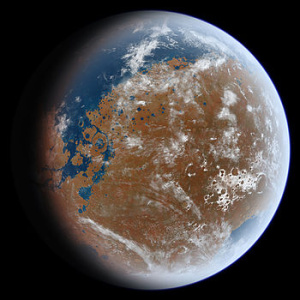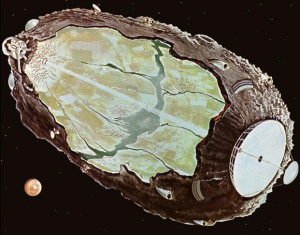
The prestigious European Space Agency has declared
Phobos, the mysterious Martian moon, to be artifical. At least one-third
of it is hollow and it’s origin is not natural, but alien in nature.
The ESA is Europe’s counterpart to NASA. Could this revelation motivate
NASA to release the secrets it’s harboring? Don’t count on it…

Proven right: Dr. Iosif Samuilovich Shklovsky
Phobos first believed artificial by famous astrophysicist
Astrophysicist Dr. Iosif Samuilovich
Shklovsky first calculated the orbital motion of the Martian satellite
Phobos. He came to the inescapable conclusion that the moon is
artificial and hollow–basically a titanic spaceship.
The Russian astronomer, Dr. Cherman
Struve, spent months calculating the two Martian moons’ orbits with
extreme accuracy during the early 20th Century. Studying the
astronomer’s notes, Shklovsky realized as the years progressed into
decades Phobos’s orbital velocity and position no longer matched
Struve’s mathematically predicted position.
After lengthy study of the tidal,
gravitic, and magnetic forces, Shklovsky came to the firm conclusion
that no natural causes could account for the origins of the two odd
moons or their bizarre behavior, particularly that exhibited by Phobos.
The moons were artificial. Someone or something built them.

How Mars appeared many millions of years ago
During an interview about the
mysterious Martian moon Shklovsky explained: “There’s only one way in
which the requirements of coherence, constancy of shape of Phobos, and
its extremely small average density can be reconciled. We must assume
that Phobos is a hollow, empty body, resembling an empty tin can.”
For decades most of mainstream science
ignored Shklovsky’s breakthrough work, until the ESA began to take a
closer look at the odd little moon.

ESA study declares Phobos not natural
The ESA study abstract that appeared in the peer-reviewed Geophysical Research Letters reveals that Phobos is not what many astrophysicists and astronomers believed for generations: a captured asteroid.
“We report independent results from
two subgroups of the Mars Express Radio Science (MaRS) team who
independently analyzed Mars Express (MEX) radio tracking data for the
purpose of determining consistently the gravitational attraction of the
moon Phobos on the MEX spacecraft, and hence the mass of Phobos. New
values for the gravitational parameter (GM=0.7127 ± 0.0021 x 10-³
km³/s²) and density of Phobos (1876 ± 20 kg/m³) provide meaningful new
constraints on the corresponding range of the body’s porosity (30% ±
5%), provide a basis for improved interpretation of the internal
structure. We conclude that the interior of Phobos likely contains large
voids. When applied to various hypotheses bearing on the origin of
Phobos, these results are inconsistent with the proposition that Phobos
is a captured asteroid.”

Casey Kazan writes in ESA: Mars Moon Phobos ‘Artificial,’ that “…the
official ESA Phobos website contained explicit scientific data, from
multiple perspectives, which strongly ‘supported the idea that this is
what radar echoes would look like, coming back from inside ‘a huge…geometric…
hollow spaceship’. In fact, they were the primary source of the
decidedly ‘internal, 3-D geometric-looking’ radar signature. The
concurrence of all three of these independent Mars Express experiments-
‘imaging,’ ‘internal mass distribution,’ (tracking) and ‘internal radar
imaging’ now agreed that ‘the interior of Phobos’ is partially hollow
with internal, geometric ‘voids’ inside it.’ Meaning that Phobos is
artificial.”
In other words, phobos is not a
natural satellite, is not a “captured asteroid,” and is hollow. This is
exactly what Dr. Shklovsky found back in the 1960s.
Phobos was artificially constructed and placed into Martian orbit by…what?

Phobos: what is it?
Data reveals Phobos is not natural. As
of now there isn’t enough information to discover exactly what the
Martian moon is, but there are several intriguing possibilities.
---------------------------------------------------------------------------
What about our moon?

4 comments:
Well, the possibility does exist that Mars was once populated by some form of species.
http://thegundeck.blogspot.com/2012/09/mars-once-somewhat-earthlke.html
When that humongous asteroid hit perhaps the then existing Martians had seen it coming and hollowed out Phobos as a orbiting lifeboat, stuffing as many as they could inside, intending to return after things settled down.
But when the asteroid hit it blew away the Martian atmosphere, so the surviving Martians in their hollowed-out space rock had no place to go and just died off in what became an orbiting coffin.
Hollowed-out Phobos just may contain the records - and the remains - of an entire civilization.
That would be so cool.
This is really fascinating stuff. Really enjoyed reading all of this stuff. So what do I think? Alien ship, superbomb, or uncompleted project? Not sure but I like the alien ship idea. Have a good one.
Bob - I like the way you can consider possibilities. That's kind of what I do, instead of just knee jerk rejecting them.
Mr. Shife - You are pretty open minded too, or you wouldn't be here, probably. I kind of like Bob's thought, a lifeboat. It makes sense, they knew some kind of disaster was coming, an overwhelming disaster, but thought maybe they could make something that would make it through. I don't know, but it's fun to speculate.
Maybe they didn't all die...
Maybe they took the ships that got them to Phobos, loaded them back up, and aimed for earth.
And just maybe a few of those ships made it.
Post a Comment